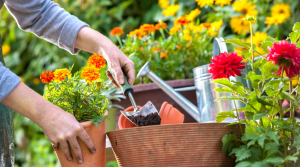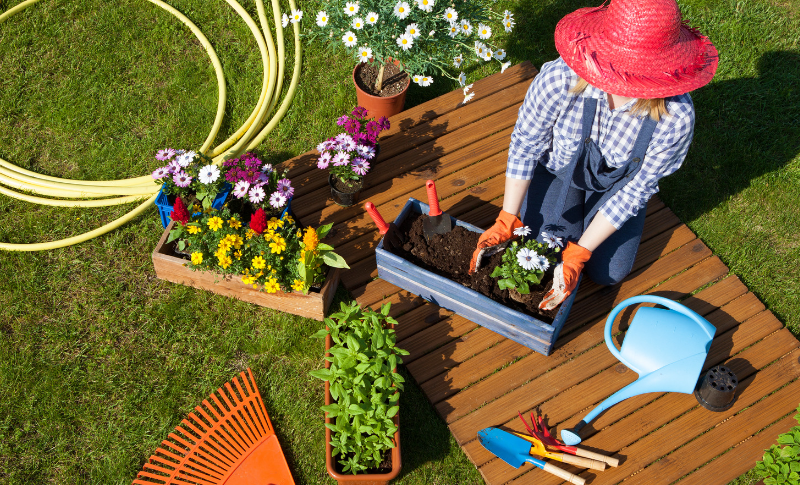Have you ever looked at a beautiful garden and wished you had the green thumb to create something similar? Well, today is your lucky day because we are going to talk about how to become a gardener. Whether you want to turn gardening into a fulfilling career or simply want to cultivate your own backyard oasis, this blog has got you covered. We will explore what it means to be a gardener, how to find gardening jobs, and what exactly gardeners do. Additionally, we will discuss the steps you can take to become a gardener yourself and share some best practices for maintaining healthy gardens. Get ready to dig in and discover the amazing benefits of gardening!
What is a Gardener?

A gardener is someone who cultivates and maintains plants, flowers, and landscapes. They work in various settings such as private gardens, parks, and commercial properties. Their responsibilities include planting, pruning, watering, fertilizing, and pest control. Gardeners use their knowledge of horticulture and landscaping techniques to create beautiful outdoor spaces.
How to Find Gardeners Job?

Researching different types of gardening jobs and determining which type interests you the most is an essential step in finding a gardener’s job. Networking with other gardeners and joining gardening organizations can also provide opportunities to connect with potential employers. To stand out from other candidates, creating a professional resume and portfolio that showcase your gardening skills and experience is crucial.
Utilizing online job boards, social media platforms, and local classifieds can help you find available gardening positions. If you’re looking to gain more experience and build a client base, consider starting your own gardening business or offering freelance gardening services. By exploring these different ways to find a gardening job, you can discover the path that aligns best with your interests and career goals.
What Does a Gardener Do?

Gardeners are responsible for tending to plants and gardens, including planting, cultivating, and maintaining them. They may also design garden layouts and select appropriate plants. With the use of various tools and equipment, they provide care such as watering, pruning, and fertilizing. Gardeners may also be involved in landscaping projects, pest control, and general maintenance tasks.
How to Become a Gardener?

Becoming a gardener can be a fulfilling and enjoyable career or hobby, allowing you to work outdoors, connect with nature, and create beautiful green spaces. Here are the steps you can take to become a gardener:
1. Develop an Interest in Gardening
Start by cultivating a genuine interest in gardening. Read books, watch tutorials, and visit gardens to learn more about various plants, gardening techniques, and landscaping.
2. Volunteer or Work in a Garden
Gain hands-on experience by volunteering at local botanical gardens, community gardens, or nurseries. This practical experience will provide valuable knowledge and insights into the day-to-day work of a gardener.
3. Educate Yourself
Consider taking gardening classes or workshops at community colleges, extension offices, or online platforms. Courses in horticulture, landscaping, and plant science can provide you with a solid foundation.
4. Obtain a Gardening Degree or Certification (Optional)
While not mandatory, a degree or certification in horticulture or a related field can boost your credibility and knowledge. Some employers may prefer candidates with formal education.
5. Acquire Basic Gardening Tools
Invest in essential gardening tools such as a shovel, rake, pruners, watering can, gloves, and a wheelbarrow. As you gain experience, you can expand your toolset.
6. Build a Gardening Portfolio
Document your gardening projects, whether they are personal ventures, volunteer work, or small jobs for friends and family. A portfolio showcasing your skills and creativity can impress potential employers or clients.
7. Consider Specializing
Gardening encompasses various areas like landscaping, vegetable gardening, floral arrangements, or bonsai. Consider specializing in a particular area to stand out in the job market.
8. Networking and Professional Organizations
Connect with other gardeners, horticulturists, and landscaping professionals through local gardening clubs or professional organizations. Networking can lead to job opportunities and valuable knowledge-sharing.
9. Seek Employment or Start Your Own Business
Look for job openings at public parks, botanical gardens, private estates, or landscaping companies. If you want to be your own boss, consider starting a gardening business where you can offer your services to residential and commercial clients.
10.Continuous Learning
Gardening is an ever-evolving field, and staying updated on the latest trends, plant varieties, and sustainable practices is essential. Attend workshops, conferences, and read gardening publications to continue expanding your knowledge.
Best Practices for Maintaining Healthy Gardens

To maintain a healthy garden, it’s important to start with the basics. Learn about different soil types, watering techniques, and proper plant care. Understanding these fundamentals will set you on the right path towards gardening success. Additionally, planning your garden layout is crucial. Consider factors such as sunlight, available space, and plant compatibility.
This will ensure that your plants have the best chance of thriving. When choosing plants for your garden, be sure to select ones that are well-suited to your climate and align with your aesthetic preferences. Regular maintenance is key to keeping your garden healthy. This includes tasks like pruning, weeding, and fertilizing as needed. Don’t forget to stay educated about new gardening techniques and pest control methods. Continuously learning and growing your knowledge will help you become a skilled gardener.
Benefits of Gardening

Gardening offers numerous benefits for both the body and mind. Engaging in gardening activities promotes physical activity, helping to improve fitness levels.
It serves as a great way to stay active and enjoy the outdoors. Gardening also has a positive impact on mental well-being by reducing stress and providing a sense of serenity.
In addition to these mental and physical advantages, growing your own food through gardening can lead to a healthier diet while saving money on groceries. Gardening provides an opportunity to connect with nature, appreciate the environment, and be more mindful of sustainable practices.
Moreover, it allows for self-expression and creativity through landscaping and design. By incorporating various NLP terms like horticulture, planting, pruning, and garden design, individuals can further enhance their gardening skills and explore different ways to enjoy this fulfilling hobby or pursue it as a profession.
Conclusion
Becoming a gardener is a fulfilling and rewarding career choice. It allows you to connect with nature, create beautiful outdoor spaces, and contribute to the well-being of others. If you have a passion for plants and a desire to work outdoors, becoming a gardener might be the perfect path for you. By following the steps outlined in this blog, you can start your journey towards becoming a skilled and knowledgeable gardener. Whether you choose to work independently or join an established gardening company, there are plenty of opportunities awaiting you in the world of gardening. Embrace your green thumb and start your gardening journey today! For more tips on how to become a successful gardener, check out our comprehensive guide.









